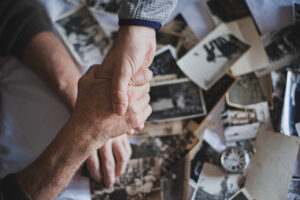Neville and Julie had shared their home for over fifty years, a modest little bungalow at the end of a quiet Court. It was a place that had once resonated with the laughter of their children and the warmth of family gatherings. But now, the walls seemed to close in on them, packed tight with the weight of their memories—and their things.
Piles of newspapers teetered precariously in every corner, kept because “You never know when you’ll need to look something up,” Neville would say. Broken appliances were stacked in the hallway, along with clothes long out of fashion, greeting cards from decades past, and furniture barely visible beneath layers of items they hadn’t touched in years. What had started as an unwillingness to part with sentimental keepsakes had grown into an overwhelming mountain of clutter, and Neville and Julie felt trapped by it, both physically and emotionally.
The notice from the Council came like a thunderclap. A firm but not unkind letter explained that their home was now a safety hazard. They were given three months to clear the space or face eviction. The thought of losing their home filled Julie with a fear so sharp it felt like it might break her. Neville, always stoic, simply placed the letter on top of a pile and said, “We’ll figure it out.” But even he looked defeated.
The couple reluctantly agreed to meet with Dr. Howard, a psychologist the Council had recommended. She came to their home one Monday morning, stepping gingerly through the narrow paths carved between the stacks of their possessions. Her face betrayed no judgement, only a deep and genuine compassion.
“Neville, Julie,” she began softly, “this is more than just about your home. I can see how much these things mean to you. But I also see how they’re weighing you down.”
Julie nodded, tears welling up in her eyes. “It’s not junk,” she said, her voice trembling. “It’s our life. Every piece has a story.”
Dr. Howard smiled gently. “I understand. But what if there was a way to keep those stories safe, without keeping them here? Have you ever thought about a storage unit?”
The suggestion hung in the air. Neville’s brow furrowed. “You mean just… pack it all away? Out of sight?”
“Not out of sight,” Dr. Howard clarified. “Just somewhere safe. Somewhere you can visit when you’re ready, but that also gives you the space to breathe, in your home.”
It wasn’t an easy decision. For weeks, they agonised over what to keep, what to let go, and what to store. Each item felt like a small piece of themselves. Julie sobbed as she placed her late mother’s teacups into a box. “She used to say we’d have tea together forever,” she whispered. Neville placed a comforting hand on her shoulder but said nothing, his own grief too heavy to put into words.
Some days, the work seemed impossible. They argued over old tools, stacks of records, and boxes of photographs. The records, dusty and warped, revealed a history of their lives: Neville held up Carole King’s Tapestry and smiled wistfully, remembering how they used to dance to “You’ve Got a Friend” in their kitchen. In another box, Julie found a small urn labelled “Arthur”—the ashes of the scruffy terrier who had been their loyal companion for fifteen years. Her hands trembled as she clutched it to her chest, tears spilling down her cheeks.

And then, buried beneath a stack of baby clothes, they uncovered a brittle envelope containing the death certificate of their first child, a baby boy who had lived only a few days. Julie held the fragile paper in her hands and looked at Neville, her voice breaking. “I think this is where all this stuff began,” she said. “We didn’t cope with losing our Jamie.”
Neville’s voice cracked as he said, “I thought we’d lost this forever.” The thought of parting with any of it felt like losing another part of their past, their identity. Julie’s hands shook as she folded clothes that no longer fit, and Neville’s heart broke when he realised he couldn’t find the watch his father had given him.
Then one afternoon, while Neville was sorting through an overstuffed wardrobe, there it was, pushed to the back. He slipped the watch onto his wrist and marvelled at its design: a gold face with delicate Roman numerals and a leather strap worn smooth from years of use. As he looked at it, vivid memories flooded back—his father’s hand resting on his shoulder during his wedding day, the watch glinting in the sunlight at family picnics, and the gentle ticking he’d hear as a child while sitting on his father’s lap. “I’ll cherish this forever,” he added softly, wondering how he could have let it be buried under things that never really mattered. Julie smiled through her own tears and squeezed his hand.
Friends and family came to help, but their offers of assistance often turned into heated exchanges. “Why are you keeping this, Mum?” their daughter asked, holding up a chipped mug.
Julie snatched it from her hands. “Because it matters to me!” she snapped, tears streaming down her face. Their daughter sighed, frustrated but heartbroken for them.
Eventually, the storage unit was filled. They chose a small unit, just enough for the items they couldn’t bear to part with. Standing in the emptying house, Neville and Julie felt both relief and an aching sorrow. The rooms seemed larger now, but also emptier in a way that made their hearts ache.
As the silence settled around them, Neville suddenly walked to the corner where he had kept the old record player. Dusting it off, he carefully pulled Carole King’s Tapestry album from its sleeve and placed the needle down. The familiar melody of “You’ve Got a Friend” filled the room. Turning to Julie, he held out his hand and said, “Would you like this dance, my love?” Julie’s eyes filled with tears as she took his hand, and they swayed together in the middle of their living room, surrounded by the echoes of a life they were beginning to rediscover.

On their first visit to the storage unit, Julie ran her fingers over the boxes. “It’s not the same,” she murmured. Neville nodded, placing an arm around her. “No, it’s not. But we still have it. And we still have each other.”
Back at home, the bungalow felt lighter. Sunlight streamed through windows that hadn’t been uncovered in years. They sat together in the living room, now clear of clutter, and held hands. The weight of the journey lingered, but for the first time in years, they could see the possibility of something new—not forgetting the past but moving forward with it.
The pain of letting go, even temporarily, was a wound they carried quietly. But they knew they had taken the first step—not just to save their home, but to reclaim their lives.

“Holding on is believing that there’s only a past; letting go is knowing that there’s a future”



